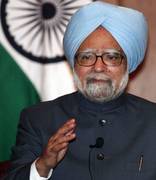In a bold speech on the 17 June at the Conference of the State Welfare and Social Justice Ministers in New Delhi, Prime Minister Manmohan Singh urged ministers to be more vigilant and do everything in their power to implement the SC/ST act that is meant to protect the human rights of Dalits and Adivasis. The PM paid particular attention to the on-going issue of manual scavenging which he called, “One of the darkest blots on our development process” saying,

“I would like to pledge that this scourge will be eliminated from every corner of our country in the next six months. The conversion of dry latrines must be completed once and for all … The Ministry of Home Affairs’ recent advisories that employing a person of Scheduled Caste or Scheduled Tribe as a manual scavenger to carry human excreta would be punishable under Section 3 of the Scheduled Castes and Scheduled Tribes (Prevention of Atrocities) Act is a strong and prohibitive instrument in your hands. I urge you to make full use of this.”
Manual scavenging is a caste-based and hereditary occupation for Dalits that is predominantly linked with forced labour. It is estimated that around 1.3 million Dalits in India, mostly women, make their living through manual scavenging – a term used to describe the job of removing human excrement from dry toilets and sewers using basic tools such as thin boards, buckets and baskets, lined with sacking, carried on the head. Manual scavengers exist in villages and cities across India and are even employed by municipalities and the railways to clear human excrements from the tracks.
The Prime Minister also addressed a number of other issues relating to caste discrimination and the implementation of laws meant to help Dalits.
He commented that it was imperative that the Protection of Civil Rights Act, 1955 and the SC and ST (Prevention of Atrocities) Act, 1989 are implemented.“Although successive governments have made progressive laws, which protect the basic rights and dignity of those who are disadvantaged in one way or the another, the real question is how to implement and enforce these laws effectively,” the Prime Minister said.
Paul Divakar, General Secretary of the National Campaign on Dalit Human Rights comments that,
“The speech of the Prime Minister, if followed through, is certainly a welcome change. It has covered both protective and developmental aspects to bring about security and empowerment to SCs and STs. However, it is to be noted that the progressive laws are there but it is important to ensure its implementation. It is even more important to see that the Special Component Plan and Tribal Sub-Component Plan for the SCs and STs are implemented in its true spirit. Only when the SCs and STs are educationally and economically empowered, will there be parity among diverse sections of the Indian society.”
In line with Paul Divakar, Indian activist and co-founder of the National Campaign for Dalit Human Rights (NCDHR), Vincent Manoharan, warns that the Prime Minister has previously spoken out against caste discrimination calling it a ‘blot on humanity’ but implementation of laws is still lacking and it remains to be seen whether this speech will have the desired effect. He does, however, see one change in these remarks, which is the time bound commitment from the PM for eliminating the practice of manual scavenging which despite being outlawed still very much exists.
Dalit activists have been campaigning for years to end the practice of manual scavenging. The activists have given a 2012 deadline for the Government to eradicate this practice completely, Bezwada Wilson tells Times of India in a recent article.
Read the full speech from the Prime Minister here
Read more about manual scavenging and the civil society campaign to eliminate this practice here
